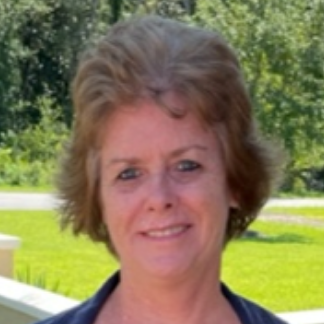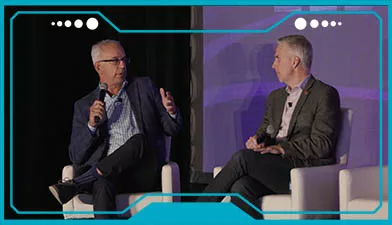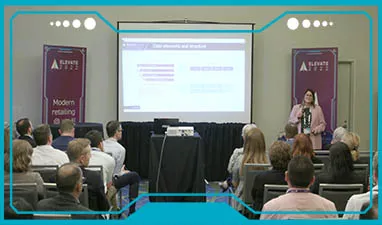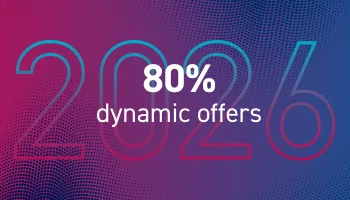On demand | Elevate 2022
Exploring dynamic offers: The report from industry players
PANEL • DYNAMIC OFFER CREATION
Technology continues to evolve to serve the changing needs of customers. Choice is not enough anymore—today’s travelers crave a customized experience. As they shift from searching for the lowest fare to searching by attribute, interoperable solutions powered with data and standards are required.
Learn how the industry is collaborating with ATPCO to create a way forward. Are you ready to play?
Daphne: Well, good morning everybody. I’m Daphne Nothwehr, a Principal Strategist and part of the ATPCO team exploring dynamic offers with the industry. And I have the honor of being the host of this next panel. We’re going to continue the discussion from the previous session and key in on some of the many ways that ATPCO’s collaborating with the industry in the move to dynamic offers. One of which, includes the Dynamic Offers Design Team.
The design team is actively working with the industry to identify and overcome barriers, and to explore industry solutions that would enable dynamic offers throughout the end-to-end process, from flight shopping to settlement and, ultimately, to unlock value for the industry.
With me today, I have an amazing panel four of our industry colleagues, experts, and valued members of the Dynamic Offers Design Team. Together, our goal is to share and highlight various perspectives on dynamic offers and the benefits of collaboration on this important topic. I'd like to welcome you all to this stage. Thanks so much for being here this morning. Alright, let's go ahead and kick off with some introductions.
Raeleen: Lovely, thanks, Daphne. My name is Raeleen Hollier. I work for Sabre. I'm a Product Manager on the agency revenue optimization chain, a call out to all of our travel agency leaders in the in the audience. Okay, that's got to change.
Jerry: Hi, I'm, well, for those of you who were here yesterday, you know my complete life story, but I'm Jerry Foran, Head of Product Delivery at British Airways and I'm the business sponsor for offer order management.
Nancy: Thank you for the opportunity to be part of the panel here. Good morning, everybody. My name is Nancy Moore. I'm with Accelya, who was formerly, most people know us as Farelogix. I've been with the company for 17 years and have been in the airline industry since 1982 and a lot of what Jerry said yesterday in his opening resonated with me… watching the industry evolve.
Marcial: Alright, good morning, everybody. My name is Marcial Lapp. I'm with American Airlines, responsible for a group called Revenue Engineering, which is a fancy way of saying all these systems that power revenue generation… so pricing, yield management, ancillaries, revenue integrity, data science, and so on and so forth, which also includes, very similar to Jerry, offer and order management.
Daphne: Awesome. Well, welcome again. I think we should just dig right in then.
So, let's go to our first question, which is really in following up on the first session on industry advancements, what resonates most with you as to why the industry is pursuing this journey toward more dynamic offers? Nancy, why don't you kick this one off, please?
Nancy: Thank you. So, I think the obvious and the short answer is the revenue optimization opportunities that the airline has that they're missing out on right now. Many people have mentioned about the McKinsey study, and the $40 billion of potential revenue by doing dynamic offers, and so that's obviously a lot of money that's left on the table. The advancements in data science and the AI that we've been hearing about, nobody was talking about this a five years ago, but that's been a real game changer in this whole industry. And it's helping airlines to be able to discover how to create dynamic offers, how to determine what a relevant offer is to a passenger, and there's many opportunities to create relevant and dynamic offers.
So, from the starting point of a passengers shopping experience, you obviously have a chance to create dynamic offers. And in the old days, when a passenger shops, you're just getting a price. And then we've evolved and we have brands and there's services that are included in the price, but when you start factoring in some of the AI and the data science that we have available now, you have the ability to dynamically create the offer based on either the conditions, whether it's the load factor, loyalty, maybe a passenger was disrupted whether voluntarily or involuntary.
And so, there's a lot of collaboration with the airlines that we do when we're talking about coming up with how to come up with the best dynamic offer for an airline. And then you always have you know those multiple touch points in which you can make these decisions on the dynamic offers. So, when a passenger is checking in, when you're planning your travel, you may have a budget. When you're checking in for a flight and you have upper cabin seats available, you can push dynamic offers that way—packaging up bags and upgrades. Or maybe your lounge is not booked to capacity and so you can also extend offers that way to try to generate more revenue.
So, obviously, there's a lot of revenue that can be had by creating dynamic offers and using the data science and the AI as part of that decision.
Daphne: Thanks, Nancy. Let's go on to you, Marcial.
Marcial: Sure. By the way, revenue is always good. So that's good reason. I'm going to maybe start a little bit differently.
Many of you guys were here yesterday and we heard a lot about sort of the science behind dynamic offer generation and I think when you think about our business, we are possibly one of the least customer-centric businesses that exists today and that is not because I'm kind of a Debbie Downer, but I think it's a reality check in, the sense of just think about the distribution landscape that we have today.
About 50% of our bookings, give or take, are through indirect channels. I don't know who those customers are. The offer is put together by somebody else. In other words, I give the ingredients, I give fares, I give a schedule, I give availability, and then somebody else constructs the offer on my behalf as an airline.
And so, when we talk a lot about sort of customer centricity, the first question I always ask is, well, how will we go achieve those things in the current ecosystem? And the answer is the current ecosystem needs to evolve.
I would maybe challenge all of you… think about kind of your daily life. The apps that you use on your phone. How many of them do you use where you don't actually create an account… you log in to consume a service? And everybody says, “Yep, airlines.” You could book a ticket and we don't ask you to do any of those things. Why is that? It's because we've kind of always grown up that way.
And so, as we think about the path going forward into what we call dynamic offer generation, of the first kind of underlying foundation in my mind, is really just focused on how do we actually start to think about customer centricity, such that I can actually use that information to make better offers to begin with.
So, there is this kind of, I call it the “foundational layer” that we need to think about as an industry. Again, to do exactly that. Once I have much more customer-based information, then I can think about, now how do I tailor my offers to the particular customer segment.
And then, to your point, about sort of using new revenue management techniques to identify customer segments, to identify trip purpose, all of that will kind of come together. And so, in a way, what we're here to do today and as part of the work with ATPCO is really to think about, well we need to think, about all these different dimensions and make progress on each one of them.
You guys heard the previous panel though, right? Where we're trying to kind of push the industry forward on all those dimensions, but it really takes a village for all of us to get together and do that. So again, the result of the question in a way is we're trying to figure out how to, yes, generate more revenue, but it really starts because we all want to be a lot more customer-centric, in my mind, than we are today and we ever have been in the past.
Daphne: Great. Yes, thank you. Onto you Raeleen.
Raeleen: Yes, I'd like to carry on from what you were saying there because I do agree, it is an evolution in the industry, most definitely. And, in representing the agency chain, in Sabre and that channel, the travel agency feels they own the traveler. They own servicing the corporation. They have requirements in the offers that they need to be serviced.
So, as Keith Wallace was talking about yesterday, has a really good relationship with the agents. Go and talk to them. How do you become a preferred carrier? You give them what they want. You talk to them because, just as we and the airlines have many strategies, the agencies, too, have different strategies and goals. Some are very clear and very targeted, and others are still trying to find out what options they have out there.
So, the dynamic offer or the dynamic price, as we now understand, are two quite different things. They need to be part of that discussion because the airline actually makes the first offer out into the ecosystem. The agency then will determine whether that offer continues on to the consultant, to the OTA, to the traveler.
Just like the basic economy situation, lowest fare is not always the need. The value of the offer, and if in our world we're asked to remove, to filter out, those basic economy fares… that's great for you because it's an immediate upsell. That's a good thing. But that is different for every agency and every travel agency customer.
So, having that conversation with your travel agency leaders and understanding what they also need, needs to come into the discussion. And that's where, in the shout out before, it's like this, and I know there's a few travel agency leaders in here, but there are few and far between. And as Marcial recognizes, they're a big part of the ecosystem and we have we want to be able to service that traveler.
Daphne: Onto you, Jerry.
Jerry: Yes, well, I cleary agree with what’s been said by my three colleagues on the panel already. Clearly, we are leaving value on the table and we’re not giving the customers what they want, or we’re not giving the customers the opportunity to look, and see, and buy what they want. So it’s good for the customer. It’s good for the airlines. It's good for our partners that are seen here with me today. So, it's good for the whole value chain.
So, therefore, it's obviously the way forward, but it does need to evolve rather than be a revolution. And Tom said in the previous one, it's going to be different for all of us and it's going to be different for airlines in terms of how they pursue this.
Will all airlines go to continuous pricing? I don't think they will.
Do they need to? I don't think they do.
So therefore, everyone's going to have a different path down this particular road and it's going to take time. But clearly, certainly from an airline perspective, we are leaving value on the table today and this is a great opportunity, both to use the science to help make better offers more relevant to the customer, and to be customer centric far more than we are today.
Daphne: Yeah. Overall, really great summary of the value and the opportunity that we're pursuing and this transformation to more dynamic offers. Okay, so let's go on to the next question then.
On the other hand, what do you see as the biggest barriers for the industry and trying to implement dynamic offers and how do you see industry collaboration to help solve these challenges helps to move us forward? Jerry, please.
Jerry: Okay, so, I mentioned in my slides, one of the slides yesterday, that we're all suffering from a lack of resources, and I think critical to this, is the resource issue. And like it's been said over and over at ATPCO conferences for years, and again at this one, and other conferences besides that, we have to work together on this. We absolutely have to work together.
If anyone thinks they can do it in isolation, if any airline thinks they can do it in isolation, well they're either a true low-cost carrier with no distribution and they're not worried about anything else… they can achieve this, but we cannot achieve this.
We have to work together, and we do have a problem with resources, and so those resources have to come together. Whether it's in ATPCO working groups, whether it's in IATA working groups, we know there is a problem, and we need people to participate. We need everybody to join in so as we can all get there quicker. Otherwise, this is going to take a very long time because we all want to… the airline industry is a funny one, but we we're competing with each other. But at the same time, we need to collaborate with each other in order to offer products to customers that we can't offer on our own. And so, it's critical. Particularly critical, now, since the pandemic, where we're so short on resources in all areas that we come together as an industry to try and get us there quicker.
Daphne: Next to you, Raeleen.
Raeleen: Yeah, I have to agree on that. One of the things that ATPCO known for is its ability to create standards, and not just a skeleton standard, but all the way drilling down through into the data app.
So, in our world, those bits and bytes turning into data-driven pricing solutions is the old world, but those standards or that way of operating so that we do one single development and then you can file the fares as you wish. There has to be the same type of logic applied to the dynamic pricing. Even Richard Ratliff yesterday, my esteemed scientist who I learned something from all the time, he said even the scientists yesterday were agreeing, which he said it's unusual, that it’s shared problem and sharing data and creating that single solution that you have the opportunity to provide your magic to is the way forward.
So instead of creating 200 different solutions, which then have to be developed end on end so maybe, by the year 3000, we'll be there. We do need to come to those standards and it should be built in a way that it doesn’t inhibit any of your magic and your offers flowing through, but being able to apply that on easy standard way, is obviously the way we want to go.
And the last part is not necessarily just concentrating on the offer, but thinking about how to that offer to your customer. That scalability, which is inhibiting some of the growth in the NDC, we have to learn from those challenges and apply have to create that question, create the answer, in the dynamic offers, so that we make sure we do get the offer to the customer correctly.
Daphne: Next to you, Marcial.
Marcial: Let's see. My biggest challenge, I think, is working with Jerry.
Jerry: Likewise. I mean, I don't mean working with myself.
Marcial: I say that, obviously, all in good fun, but Jerry is right. In the sense, the biggest challenge is a resource constraint, but I think we're also, again I know I’m kind of echoing what you were saying, but it's this fact that we need to work together to solve some of these problems. Because, one, we don't have all the resources, all the right team members we have right, probably, very similar to other airlines… we had a lot of brain drain over the last two or three years and so the folks that are still here have a lot of great knowledge, but by the way, we're all being asked to do things 100 miles an hour every day. And so, when you try to move the industry forward, to do those things in parallel is hard.
So, what we're trying to do, working with our friends, colleagues across the OneWorld Alliance, British Airways, and so on and so forth, is to go ahead and drive these initiatives forward, knowing that we can all contribute and really, the key is, we have to make it work anyway.
Like, the whole point of this is not about American Airlines creating an offer management solution or an order management solution, it is about making sure that our customers, again, previous point about customer centricity, is we are trying to make sure that our customers can travel across the entire American Airlines network, including that of our partners.
And so, when that kind of clicks through a couple of times, you quickly realize that “hey by the way I can't do this by myself,” and by the way, it actually makes a lot more sense to have more industry we sometimes we say, oh, standardization is how we got here in the first place, but there is need for having an organization, whether it's ATPCO, IATA, or whoever, to help with this process of connecting airlines together.
We’ve taken a very, how do I put it, a very thought-out process of what are the routes that we, American Airlines, will fly on our metal, and which are the routes that we will, or the destinations that we will, serve with our partners? In other words, we will have a very, or we have a very large network, but it's only enabled because of the collaboration.
And so, therefore again, we need to make sure that we are building solutions that are industry solutions and that will connect across each other. And again, that is very much a priority for what we call our joint businesses. We have, believe it or not, we have plenty of steering meetings that Jerry and I love.
And those create a prioritization, it creates a hey, by the way, you need to give us an update how is this going. So, it's there's somebody that kind of prods you along a little bit which is which is great, but we need more of that, and we need more industry participation along the same lines.
Daphne: Alright, thank you and Nancy.
Nancy: So, what everybody just said like resonates very true. We're all, partly because of the pandemic, short on resources, but this industry is making a lot of changes and we're moving slowly, which is kind of typical in this industry. I remember when the concept of paperless e-tickets came out, it took a while for the industry to adopt the concept of e-tickets.
So, now here, we have this dynamic offer concept that has been talked about for several years now and trying to get the industry to move forward. So, airlines need to control their offers and that's a really high priority. In order to do that, that's what NDC is doing. And the adoption rate of NDC is going very slowly.
So, in the indirect channel, some of the recent numbers is, like there's a 10 to 15% adoption rate of NDC. And yet, there are hundreds of API providers that are out there that have already adopted NDC.
And so, having these standardizations, working with IATA and now ATPCO announced that they're going to have an NDC team to talk about the gaps, because there's a lot that NDC doesn't have. And so I think some of the, the airlines have hesitated jumping on the bandwagon and getting involved in NDC. But, controlling your offer is one of the important factors in dynamic offers.
Daphne: Yeah, thank you so much, Nancy. Well, I don't know Marcial, but I think I heard you say or suggest that we need more industry poking and prodding. So, ATPCO volunteers, we'll go ahead and continue our role in that. No, thank you so much everybody.
Marcial: I just have this great visual in my mind of you know like the electronic cattle prod.
Daphne: Yeah perfect.
Raeleen: I feel that's Melanie Dezelak in some of our meetings, prodding with the questions.
Daphne: Yeah, that is a great summary of the challenges that we're hearing in our industry discussions, whether in one-on-one discussions or with the design team and really also just strengthens the argument that we need more cooperation, more collaboration to move this forward.
Okay, so let's take this a step further then. The next question then is, from your perspective, what is the very top priority or most critical challenge for us to work through together and why? Let's start with you, Marcial.
Marcial: Sure, and I'm going to start maybe the answer with a little bit of a reflection in a way. What I mean by that is, I started in this business 11 years ago. So, maybe not quite as veteran as some other folks. And you learn some of the basics of our business and you say, why are we doing it this way? This seems silly. This seems archaic, right. And we all kind of go through these stages of grief, in a way, and we try to figure out, okay, well, yes, let's go and revolutionize things and I think for quite a while, there was a belief that what we could do is we could just say, by the way, let's just take out the old and we'll put something new and it's going to be great.
And then, I think we realized that, hey by the way, that is very sort of… you're driving the car down the road and you're changing the engine while you're driving. None of us are ever going to shut down our airline. Certainly, not any anybody that wants to stay employed, to say by the way, we're going to shut down for seven days… going to turn this on, turn this off, and we'll tell our customers to go home. That doesn't happen.
So, what I'm trying to illustrate is that what we're, I think, getting to, is a little bit of a transition or transition in thinking, in the sense of it's less about let’s wait until the shiny new offer order management solution is ready, because we're going to be waiting forever. And so, my thinking on that has certainly changed and I think this is, in a way, kind of going to question about what are the top priorities.
The top priorities in my mind, a lot of times are now focused on “how can we make some incremental progress to where we want to go?” We know where we want to go. We also realized this can't be this knife edge cut over. So, let's start thinking about the solutions that we can put in place from now until we get there.
What I've always loved about this business is that anybody that works in the airline business has a little bit of… how do I put it… like a jack-of-all-trades attitude. In other words, we can solve any problem because we are a bunch of clever folks that really know our stuff really well and we can use some duct tape, and some string, and connect the red wire to the blue wire and it'll work.
As much as I don't want to create more technical debt that we will have to pay for later, we will incur some of that as we go in through this transition. And so, to make what I'm saying a little bit more tangible…
What we're working on right now, very similar to many other airlines, is trying to figure out how to create more dynamic, continuous pricing—whatever definition you want to use—the biggest challenge is servicing.
So, we have a goal at American Airlines, where we say, hey, by the way, we will no longer put a product into the marketplace that we cannot service digitally. Meaning, it was very acceptable couple of years ago where we said, hey, by the way, let's go do this and by the way, if customers problem, they called RES, our call center. That's awful, right.
So, we said, by the way, yep, again, no new products unless they can be completely self-serviced on aa.com. So now you have this mandate, which is perfect because that's exactly what we should be doing for our customers, but it also creates a lot of complexity because by the way, every vendor, no offense, will tell you that yes, by the way, I could sell everything. And it's like great, you can sell everything, but what about servicing?
Well, you do that internally. Well, that's not, that's not going to work, right. And so, what we're doing is we're actively seeking out solutions where we can use some of the existing technology to maybe bend it into ways that it wasn't meant to be bent. But that allows us to unlock some of these capabilities because again, we need to be able to sort of create offers.
We need to be able to service them such that our customers create this very… shocker, digital experience. Heck, it's 2022 that is table stakes, right. So, in a way, this is a call for what we're doing in the ATPCO dynamic offers group, which is trying to figure out how do we take some of this existing technology that we all know and love, and how do I evolve it in a way that I can do some of these newer cooler things that do drive revenue, they do drive customer centricity, and it is all in this sort of journey towards amore wholesome, again, shopping and a digital experience.
Daphne: Next to you, Nancy. Thank you.
Nancy: Yes, so what you just commented about, Marcial, about being able to service a ticket, I mean that's one of the biggest challenges… is whatever solution comes out of the group, you have to make sure that it works end-to-end. So, from the very beginning back to revenue management, and then the servicing of the ticket because if you can't service it, then you're not going to have value to even do dynamic offers.
So, we have to make sure that the whole end-to-end process works, and with all the alliances that airlines have, I think Interline is another component. It's a challenge that needs to be solved as well. And as we talk through solutions, every airline’s motivation is different, their ability to invest in the technology changes differs, and we need to remember that it's not a one-size-fits-all.
Every airline needs a different type of solution and ATPCO is helping to facilitate. But the working group itself, having more airlines and more systems involved, just makes it makes the solutioning all the better.
Daphne: Onto you, Jerry.
Jerry: Yeah, again, I agree with my colleagues. Servicing is absolutely critical And that’s why I think one of the biggest priorities for me is moving forward on order management because I think dynamic offers, dynamic pricing today, moving to dynamic offers, that will evolve and it will happen and we've heard the data scientists yesterday talking very eloquently about how it's going to work in the future. And I'm sure all that will happen.
But if we don't successfully migrate from the reservation system of today in the PSS to an order management system, it might all be a waste of time or we're going to make our lives a whole lot more complicated. I think the order management system and the development of that capability is underplayed, in my view. It's really, really, really critical to this whole thing. It doesn't sound like it's critical to some people. They think it's all about the offer and the bundle and giving the customer what they want.
But going back to the servicing point, and everything else, and how we talk to partners and communicate with them, the order management system is absolutely fundamentally critical to that and understanding how that will work, and clearly the transition. Understanding that, starting to understand that transition now, and again, how we can help each other through that transition process, which will be absolutely huge.
The other thing I would say is and I've noticed it in this conference, and I'm guilty of it myself, is we talk to each other and we use terms, and I'm not sure we're talking the same language. Is a dynamic bundle the same as a dynamic offer? What does a product catalog mean? How many people actually understand that? What does that connect to? How does it make a difference? And is there only going to be one product catalog?
All of these things, a true definition of these terms, and I know both IATA and ATPCO have talked about this, but we need a true definition of terms, which is available to everyone in some detail about what these things are so people can then understand what it is. They need to do and how these things actually fit together rather than listening to someone like me talk about it on stage and you'll have glazed over eyes as to what does that mean for me, what does that mean for my company, my airline as a supplier, whatever, we need to have a common understanding of what we're talking about.
This is the biggest change in our history from a commercial perspective. Like I said yesterday, not much has changed since 1976, to be frank, and now we have an opportunity to change it significantly for the benefit of everyone, but we need to be talking a common language and understand what it is we're saying we're going to do and how we're going to deliver it.
Daphne: Finally, Raeleen.
Raeleen: I love that you cover that because there has been a few terms this week that have come up and I'm thinking, what are they talking about? And I know it's not just me, I know it's not just me. So, that clarity is so necessary and you really need to step forward and engage in that learning. That's part of what we're all here for. Everybody is an expert in their area.
If we don't all put our two cents worth in, we're not going to get there. And I think the buzzwords and the buzz phrases…a glossary, a term, what a wonderful, what a great idea. Sometimes the most practical suggestions are just simply the best.
So, it is a collaboration. There is absolutely no question about that and in the dynamic offers design teams we have lots more questions and answers. That is simply the nature of the beast.
We’re on, what they call, the bleeding edge of new development, but we have to get there and get those answers clarified so we’re all on the page and we all understand our own goals, our own priorities.
As a GDS, obviously, we’ve got to keep developing the old and you’re still giving us product plan items that are critical. Even though we're so far along in the development from fares and rules, there's still work there that has to be done. So, trying to prioritize, okay, do you want the refund taxes X3 record or do you want dynamic offers or do you want in NDC with the next airlines and their interpretation of those standards? It is difficult with the resources. We need compelling reasons to move in a certain direction and sometimes we have to make hard decisions of what priorities we work for. But that's the nature of any development, any business.
But I love your idea of glossary. I am so there with you. Thank you.
Daphne: Thank you all. We've touched on several critical challenges for us to work through together. A lot of questions and a lot of work to be done, and collaboration is key here. I think we're better off working together.
Alright, so final question for you. As a member of the dynamic offers design team, what do you see as the biggest benefit of participating? And what do you say to encourage those who might be considering getting more involved? Raeleen, why don't you?
Raeleen: Thank you. I'm going to keep going with my theme, I think. Melanie Dezelak, you're going to hear from later on today, is our poker and prodder on the design team… asking the hard questions and making us think through answers. Now sometimes, just like in any discussion, sometimes it's just as important to take things off the table than to put them on the table.
If you realize that solution is not going to work, you put it aside and move on to the next thing. But there are so many different points of view. I’ve really enjoyed the collaboration, but to be perfectly honest, just as we were talking about the glossary, there are times where I sit in there and it's like heaven's above. What is Richard talking about? I need to get more lessons there.
So, we never stop learning and if we try to avoid that it's not going to work. So, we need to jump in with both feet, be willing and open to learning new lessons and listening to our customers, both the travel agency customers and the airlines and the technology partners to try and come up with that great solution that not only presents the offer… the right offer, at the right time, as Tom says, but to do it very quickly. Very quickly. The more, the merrier is the design team need.
Daphne: Yeah, thanks. Now to you, Marcial.
Marcial: Sure. I think to me it's actually rather simple. It's one of those industry forums where… must be present to win. In the sense of you can choose to not participate and we will be happy to kind of set some standards. Again, must be present to win.
So, I would encourage anybody that is interested in sort of what we are working on, evolving this industry to get involved, and at least you know be a fly on the wall. Understand what are the questions that airlines and suppliers of technology are throwing out there to help us all think about again, what are possible solution paths?
Give you guys an example of what we just talked about in terms of challenges, right, another one for example that I keep thinking about this is actually kind of related to the travel agency community, right.
So, we do a lot today that has to do with things like the concept of, or I think Nancy you mentioned, like ticketing. And a lot of things are driven off the fact that we have tickets and, yes, that's been this how this industry has run forever. But what if tomorrow I said I'd get Jerry's order management system and I don't have a ticket.
What mechanism does my travel agency then have for, I don't know, some sort of back end compensation scheme, if there's no such thing as a ticket that runs through some sort of clearing house?
All those things are sort of mind benders in a way, but those are the questions that we will have to answer at some point in the future. The future is now to kind of talk about some of those things and again, it's not because we all have the magic solution, but the more you have some of these discussions, the more you will be able to have “that was a great idea” or “I like that path… let’s go down this path,” and really embrace this idea of kind of fail fast, in the sense.
Yes, we will go do something, we'll try it. If it works, great. If it doesn't work, we'll move on. And so, if you have that kind of mentality, combined with some of the experience that we have across those different groups, which allows everybody to participate and we all kind of know what… Well, I don’t know… half the time we think we know what we’re doing. To Jerry's point, we should write more things down, but that's really I guess, like I said, my call to action for everybody here.
That if this is something of interest to you and you feel like you can contribute, you should participate. And again, this is not a plug for, just ATPCO’s forums, but again, this is in my mind really an appeal to everybody for kind of the larger airline business, because, again, ATPCO is one of the large constituents, there are many others out there, but again you should feel encouraged to be part of it.
Daphne: Next to you, Nancy.
Nancy: Thank you. So, being part of this ATPCO dynamic offers working group has been quite a learning experience. The participants range. You've got the airlines, you have system providers, you have data scientists, you have the travel professionals. So, all aspects of the industry, revenue management or revenue accounting, is part of the group. So, with everybody's participation, we can make sure that the solutions that we talk about and the ideas that we have works from end-to-end, and that's one of the key components.
The other great thing is ATPCO is just the perfect, unbiased partner that we could have in this industry. Yeah, we all pay like a lot of money for… sorry ATPCO… but we pay money for subscription fees. So, there's that cost there, but here you have it's almost like we're hiring a consultant free of charge, if you put the subscription fees aside, but hiring a consultant free of charge, that their goal is to solve the industry problems and to make the airlines operate better, make them more efficient, help the systems standardize, make sure that the information that flows through the system comes out the same by developing standards. And so, they have ears on the ground. And yesterday, with their announcement about the NDC team to try to solve challenges, I mean they hear about a problem and then they want to jump in and help provide solutions.
So, that's what this dynamic offers team does, is we just talk through solutions. And you don't even have to contribute if you're not really sure how dynamic offers, like, what it even means to you, but just come. You can listen, you can learn from it. That's one of the biggest benefits is you've learned so much.
Daphne: And finally, Jerry.
Jerry: I completely echo Nancy's last point. Many people don't join these working groups because they don't think they're able to contribute and I think that is in most cases a mistake. You don't know what you can contribute until you join the group, and you listen to what everybody else is saying. Not only do you learn, ultimately, you contribute, and it helps.
Certainly, in all the years I've been looking after a team which attends working groups in ATPCO and IATA, and as Marcial was saying, there's many other forums across airlines and everywhere else. Sending people to these things to contribute for the benefit of the industry has been very beneficial to the individual as well. It helps to grow the individual; it helps to grow the people they work with in learning and understanding this stuff so we can all go forward together.
I had breakfast this morning with my fellow ATPCO Board Member, Nobu Yamanouchi from Lufthansa, and he’s the chair of IATA POC. They have lots of trouble there with resources and he asked me to make a plea to this group today. It isn't just about the ATPCO working group, it's about all these groups. There's plenty of opportunity to get involved and to participate in it, and it should be taken. We absolutely need to do this together.
Daphne: Yes, awesome. Thank you so much for the comments and the encouragement to those who may be considering getting more involved. There's no doubt that dynamic offers is certainly a high priority for the industry and we encourage everybody to learn more.
So, the question then really is to each organization, each person in this room is, are you involved? If you are, we thank you for staying engaged and maybe it's time to level up your participation. If you're not involved, it's definitely time to get in the game. There are lots of ways to participate, whether in the design team or focus team that's digging into specific topics through various explorations and proofs of concepts, or you can simply follow along on our website, MyATPCO, or through our team communications. One of the beauties of ATPCO communities is the shared learnings and you can choose your level of participation and stay engaged from wherever you are in the world.
If you are interested in getting involved or would like to hear more about our current dynamic offers solutions, and those that we're exploring for the future, please join us this afternoon at 3:30 PM for our breakout session “Creating at play,” and be sure to connect with us. We would love to speak with you.
I would like to thank our four panelists for your insights and sharing your thoughts on collaboration for dynamic offers. We certainly appreciate your time and ongoing commitment to this and other initiatives.
In closing, there's no doubt there's value to be unlocked for the industry in this journey to dynamic offers. We believe we can overcome the challenges and complexities of this change and move the industry forward further and faster when we work together. And ATPCO is committed to working with you. Thanks so much for listening.
An event experience you can't miss
ATPCO's Elevate + ARC's TravelConnect
Speakers

Daphne Nothwehr
Principal Strategist, ATPCO
Since joining ATPCO in 2012 and before that in her 10-year career with Northwest/Delta Air Lines, Daphne has many years of experience in the airline industry in various roles across sales, revenue management, product, and corporate strategy. A strategic thinker, she enjoys analyzing trends and business processes to identify opportunities to drive industry value, a great fit for her current role in exploring what new and improved data is required to move the industry forward on its journey toward dynamic offers.

Jerry Foran
Head, Product Delivery, Global Revenue, British Airways
With more than forty years and several management positions within the commercial area, Jerry now leads a three-year program to upgrade BA's revenue management capability to ensure it can take advantage of developments in price and inventory distribution. For three years, Jerry was based in Japan as commercial manager. He has extensive revenue management experience, including project managing BA’s team on the Amadeus Altea Inventory project during its specification stage. He also serves as ATPCO’s chair of the board, member of the ATPCO board Executive and Nominating Committees, chair of the IATA Passenger Tariff Conferences Steering Group, BA's voting representative on the IATA Joint Passenger Services Conference (JPSC), member of IATA's Passenger Distribution Group (PDG) looking at New Distribution Capability (NDC), and member of IATA's PDG Advisory Forum.

Nancy Moore
Director of Pricing, Ticketing, Revenue Management, Accelya
Nancy has been in the travel industry for 40 years, working for a travel agency, airline, and air transport technology providers. Raised in a family that owned numerous successful travel agencies, her experience naturally started at her parents’ travel agency. Later, it evolved to Eastern Airlines, System One/EDS, where she discovered her passion for the world of pricing and ATPCO. Since joining Farelogix, now Accelya, in 2005, she has been overseeing airlines' pricing and ticketing implementations, as well as the development and implementation of Accelya’s state-of-the-art pricing engine, where continuous pricing is supported. Nancy has participated in many ATPCO working groups, including the current ATPCO Dynamic Offers Design Team.

Raeleen Hollier
Project Manager, Sabre
Raeleen has over 40 years of travel industry experience and 33 years with Sabre. She is the driver behind Sabre’s Revenue Optimization suite of products for agencies. She brings a plethora of knowledge from her days in Pricing Marketing. As Sabre's representative for ATPCO and IATA, she has been dragged back to ATPCO for Dynamic Offers and is thrilled to be working with great friends. She enjoys nothing more than solving problems for our most innovative agencies and is highly regarded across the industry. Her favorite saying is that she learns something new every day.

Marcial Lapp
Managing Director, Revenue Engineering, American Airlines
Marcial’s group is responsible for the systems, data, and business processes that power American’s commercial groups, including revenue management and network planning. Marcial began his career in 2010 as an intern where he developed the optimizer for the overbooking system. He later joined as Chief Scientist RM, where he led the development of an improved network controls model and managed several domestic markets. After managing the Mexico, Caribbean & Latin America region, he led the Operations Research and Data Science group, responsible for the technical implementations of systems that drive revenue outcomes. Marcial earned a doctorate in Industrial Engineering and an MBA from the University of Michigan. He lives in Arlington, Texas, with his wife, Allysen, and his sons, Otto and Marlo.
You might also like



